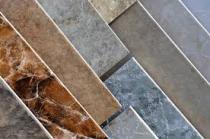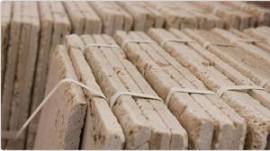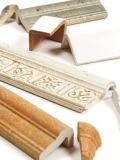Porcelain Tile
Porcelain tile reflects refined beauty in flooring, as well as being durable to high foot traffic and highly resistant to moisture. Porcelain tiles are durable enough to serve in nearly every area of any property, as tough as natural stone. Although both ceramic tile and porcelain tile are created in kilns at extreme heat, porcelain tiles are fired at a higher temperature resulting in a stronger product.
• Scratch resistance - Extremely resistant to scratching and deeper abrasions. Glazed porcelain is also very stain resistant.
• Strength - Porcelain - tile is stronger than most stone products on the market and is unaffected by UV rays. It will not create static electricity and will stand up to almost any chemical agent.
• Fire resistance- Porcelain tile will not burn and does not produce toxic fumes.
• Water resistance- Porcelain tile is far more resistant to water than ceramic tile. The absorption rate for porcelain tiles is 0.5% and even less.
• Maintenance - Glazed porcelain tile maintenance is as simple as a quick sweep and a mop when necessary, however if your choice of tile is natural or polished porcelain, be sure that your floor is properly sealed otherwise cleaning could get more difficult!
• From a green perspective - porcelain tile is another great choice for your kitchen floor as they are made entirely from natural materials and therefore do not cause any harm to landfills
Ceramic Tile
Ceramic Glazed - This is the most common type used for today's floors and walls in both residential & commercial applications. The advantages:
•Resistant to stains
•Resistant to scratches
•Fire resistant
•Not faded by sunlight
•Resistant to slipping
•Easy to keep clean
Glazed tiles are available in high-gloss, matte, and abrasive slip-resistant finishes and almost any color. Glazed tiles also come in decorative styles with a pattern or hand-painted design. The glaze on the tile doesn't go all the way through, so if it gets chipped, you're going to see the color inside. Glazed tiles may tend to get scratched on frequently-used countertops, but they're ideal for walls.
Mosaic tile is made from different types of clay with color pigments added so the color goes all the way through the tile. Mosaics are suitable for almost any surface because they resist moisture, are stain-proof and will not chip easily.
Quarry tile is a broad classification for any tile made out of a mixture of clays. They are usually deep red in color and left unglazed. These tiles are used mostly for interior floors because they're usually porous and irregular in shape. The surface of these tiles can be sealed or left unsealed, although, they may stain if left unsealed.
Natural Stone Tile
Another hot trend is natural materials such as slate, marble, granite, travertine, and limestone cut into thin pieces and installed like tile.
Natural stone is a product of nature. No two tiles are exactly alike. A customer should request a sample of the tile from their sales representative prior to making a final decision. Furthermore, we recommend that a customer inspects the purchased material prior to installation to check for color, veining, thickness, sizing, and finish. Please ask for information on pre-sealing, sealing, and ongoing maintenance.
Common Types
• Unfilled- Stone tile with naturally occurring holes.
• Filled- Stone tile with its naturally occurring holes filled with a mixture of a hardener
and dust obtained from the cutting and honin process.
• Polished- During production, a facet is put on each crystal at a microscopic level –
much as a jeweler would facet a diamond. The resultant smooth surface allows light
to refract in and out of the stone in a parallel way.This enhances the visible sheen and
gives the appearance of depth.
• Honed- A smooth, non-reflective finish achieved by grinding the surface.
• Saw Cut- The untreated surface of a stone when it is first cut. The surface is slightly
rough.
• Tumbled-(ancient stones): An antique look achieved by rounded corners and edges.
Tile Trim
Most lines of tile have special tiles for creating borders and accents, along with ones for finishing corners and edges. These will give your project a professional look. You can get really fancy with your tile layout, such as cutting down larger tiles to make a simple but fashionalble accent strip in your design.
These come in many different varieties. There is glazed tile which is used in the field and will only have glaze on the top surface. This is so they can butt up to other field tile. Special tiles will be rounded at the edges to finish off the field tile. Bullnose is a term used to describe rounded-edge tile. A single-edged bullnose tile is used to finish off the top of a wall, like a bathtub surround, or the edge of a countertop. A double-out bullnose has two rounded edges for finishing off the corner of a tile section. Edge tile is used for around the overhang of a countertop. If your line of tile doesn't come with an edge tile, you can substitute it with a bullnose tile on top and a regular field tile at the edge.
When installing wall tile, you usually want to finish off the bottom row with special base tiles. These are flared at the bottom and make a nice transition to the floor. The top of the base is square to butt up to regular field tile. There is also a tile called a "sanitary base" which has a finished top. These are used in areas where there won't be wall tile. You for the most part can find a trim tile for your needs. It may not always match the tile you have picked out, but by changing color or style you can add that litlel accent that is needed to find the look that you desire.




